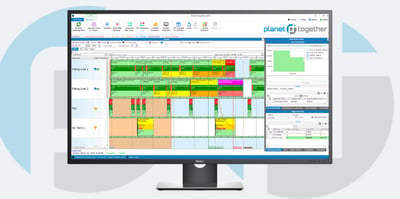Eco-Friendly Manufacturing
With growing environmental concerns, stringent regulations, and increasing consumer demands for eco-friendly products, companies are under pressure to adopt sustainable practices throughout their supply chains. Sustainable manufacturing isn't just a buzzword; it's a necessity. As a Purchasing Manager in an industrial manufacturing facility, you play a pivotal role in driving sustainability initiatives.
In this blog, we'll explore the importance of sustainable manufacturing practices and how integration between PlanetTogether and leading ERP, SCM, and MES systems can streamline your efforts.

Sustainable Manufacturing
Sustainability in manufacturing encompasses a range of practices aimed at reducing environmental impact, conserving resources, and promoting social responsibility. From minimizing waste and energy consumption to ethically sourcing materials and promoting worker welfare, sustainable manufacturing is about making responsible choices at every stage of the production process.

Why is it crucial for industrial manufacturing facilities to prioritize sustainability?
Regulatory Compliance: Governments worldwide are enacting stricter regulations to curb pollution, reduce carbon emissions, and promote sustainable development. Non-compliance can result in hefty fines, tarnished reputation, and even legal repercussions.
Consumer Expectations: Today's consumers are more environmentally conscious than ever before. They prefer products from companies that demonstrate a commitment to sustainability. By embracing eco-friendly practices, manufacturers can attract and retain customers, enhancing brand loyalty and market share.
Cost Savings: Contrary to popular belief, sustainable manufacturing isn't just about environmental stewardship; it also makes good business sense. By optimizing resource usage, minimizing waste, and enhancing operational efficiency, companies can lower production costs and improve profitability in the long run.
Risk Mitigation: Climate change, resource scarcity, and supply chain disruptions pose significant risks to businesses. Adopting sustainable practices can enhance resilience, reduce vulnerability to external shocks, and ensure long-term viability.

Integrating PlanetTogether with ERP, SCM, and MES Systems
Effective sustainability initiatives require seamless coordination across various departments and systems within an organization. Integration between advanced planning and scheduling (APS) solutions like PlanetTogether and leading ERP, SCM, and MES systems is key to achieving this synergy. Let's delve into how this integration can enhance sustainable manufacturing practices:
Enhanced Visibility and Data Accuracy: Integrating PlanetTogether with ERP systems such as SAP, Oracle, or Microsoft Dynamics enables real-time data exchange between production planning and other business functions. Purchasing managers gain deeper insights into inventory levels, material availability, and supplier performance, facilitating informed decision-making and proactive risk management.
Optimal Resource Utilization: By integrating APS with MES systems like Aveva or Wonderware, manufacturers can synchronize production schedules with shop floor operations in real time. This ensures efficient utilization of resources, minimizes idle time, and reduces energy consumption, thereby supporting sustainability goals.
Demand-Driven Planning: Integration with SCM systems like Kinaxis allows for demand-driven planning and inventory optimization. Purchasing managers can dynamically adjust procurement strategies based on demand forecasts, market trends, and sustainability criteria, ensuring adequate supply while minimizing excess inventory and waste.
Collaborative Supply Chain Management: Sustainable manufacturing extends beyond the four walls of a facility; it requires collaboration with suppliers, vendors, and partners. Integration between PlanetTogether and external supply chain networks enables seamless communication, collaboration, and information sharing, fostering transparency, trust, and mutual accountability.
As a Purchasing Manager in an industrial manufacturing facility, embracing sustainable practices isn't just a moral imperative—it's a strategic imperative. By integrating advanced planning and scheduling solutions like PlanetTogether with ERP, SCM, and MES systems, you can drive efficiency, mitigate risks, and enhance sustainability across your supply chain.
Remember, sustainability isn't a destination; it's a journey. Start yours today and pave the way for a greener, more prosperous future.
Are you ready to take your manufacturing operations to the next level? Contact us today to learn more about how PlanetTogether and integrated scheduling solutions can help you achieve your sustainability goals and drive success in the your industry.